Related Research Articles
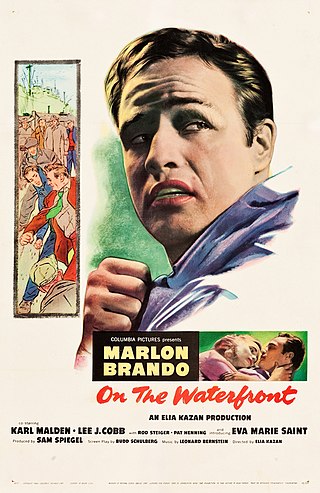
On the Waterfront is a 1954 American crime drama film, directed by Elia Kazan and written by Budd Schulberg. It stars Marlon Brando, and features Karl Malden, Lee J. Cobb, Rod Steiger, Pat Henning and Eva Marie Saint in her film debut. The musical score was composed by Leonard Bernstein. The black-and-white film was inspired by "Crime on the Waterfront" by Malcolm Johnson, a series of articles published in November–December 1948 in the New York Sun which won the 1949 Pulitzer Prize for Local Reporting, but the screenplay by Budd Schulberg is directly based on his own original story. The film focuses on union violence and corruption among longshoremen, while detailing widespread corruption, extortion, and racketeering on the waterfronts of Hoboken, New Jersey.

Clarence Malcolm Lowry was an English poet and novelist who is best known for his 1947 novel Under the Volcano, which was voted No. 11 in the Modern Library 100 Best Novels list.
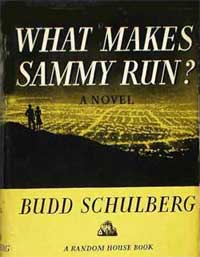
What Makes Sammy Run? (1941) is a novel by Budd Schulberg inspired by the life of his father, early Hollywood mogul B. P. Schulberg. It is a rags to riches story chronicling the rise and fall of Sammy Glick, a Jewish boy born in New York's Lower East Side who, very early in his life, makes up his mind to escape the ghetto and climb the ladder of success by deception and betrayal. It was made into a 1965 Broadway musical.

Rasipuram Krishnaswami Iyer Narayanaswami, better known as R. K. Narayan, was an Indian writer and novelist known for his work set in the fictional South Indian town of Malgudi. He was a leading author of early Indian literature in English along with Mulk Raj Anand and Raja Rao.

Under the Volcano is a novel by English writer Malcolm Lowry (1909–1957) published in 1947. The novel tells the story of Geoffrey Firmin, an alcoholic British consul in the Mexican city of Quauhnahuac, on the Day of the Dead in November 1938. The book takes its name from the two volcanoes, Popocatepetl and Iztaccihuatl, that overshadow Quauhnahuac and the characters. Under the Volcano was Lowry's second and last complete novel.
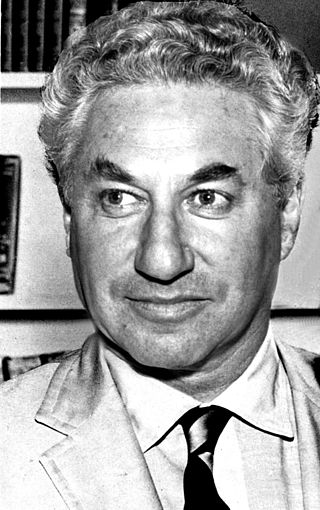
Budd Schulberg was an American screenwriter, television producer, novelist and sports writer. He was known for his novels What Makes Sammy Run? (1941) and The Harder They Fall (1947), as well as his screenplays for On the Waterfront (1954) and A Face in the Crowd (1957), receiving an Academy Award for the former.

A Face in the Crowd is a 1957 American satirical drama film directed by Elia Kazan and starring Andy Griffith, Patricia Neal and Walter Matthau. The screenplay by Budd Schulberg is based on his short story "Your Arkansas Traveler" from the 1953 collection Some Faces in the Crowd.
Charles K. Feldman was a Hollywood attorney, film producer and talent agent who founded the Famous Artists talent agency. According to one obituary, Feldman disdained publicity. "Feldman was an enigma to Hollywood. No one knew what he was up to – from producing a film to packaging one for someone else."
Sol Stein was the author of 13 books and was Publisher and Editor-in-Chief of Stein and Day Publishers for 27 years.
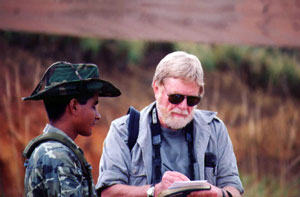
Douglas Turner Day III was an American novelist, biographer, scholar and critic. He was a popular professor of English literature at the University of Virginia, where he taught for almost four decades.
Patricia Rinehart (1930–1996) was an American poet and playwright.
The Disenchanted is a 1950 American novel by Budd Schulberg.
Julian Barry was an American screenwriter and playwright, best known for his Oscar-nominated script for the 1974 film Lenny about comedian Lenny Bruce. Barry adapted the script from his successful Broadway play of the same name. The film, directed by Bob Fosse and starring Dustin Hoffman and Valerie Perrine, was nominated for the so-called Oscar Grand Slam, one of some 40 films to be so honored.
Margerie Bonner was an American actress, scriptwriter, and novelist. She is best known as the wife of Malcolm Lowry and for her support of the author while he wrote his best known novel, Under the Volcano, considered one of the finest novels of the 20th century.
Stanley Rose was an American bookseller, literary agent, and raconteur, whose eponymous Hollywood bookshop, located adjacent to the famous Musso & Frank Grill restaurant, was a gathering place for writers working or living in and around Hollywood. Rose's most notable literary associates were William Saroyan, to whom he was variously a friend, a drinking and hunting companion, and a literary representative; and Nathanael West, whose 1939 novel The Day of the Locust owed much of its “local color” to its author's acquaintance with Rose.
Stein and Day, Inc. was an American publishing company founded by Sol Stein and his wife Patricia Day in 1962. Stein was both the publisher and the editor-in-chief. The firm was based in New York City, and was in business for 27 years, until closing in 1989.
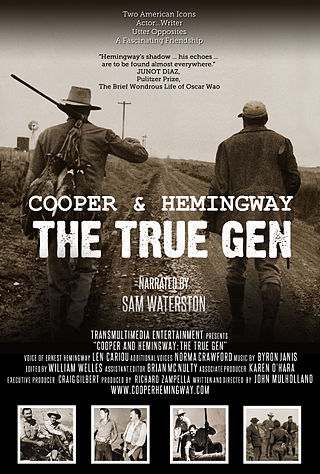
Cooper & Hemingway: The True Gen is a 2013 documentary film about the 20-year friendship between writer Ernest Hemingway and film actor Gary Cooper. Written and directed by John Mulholland, it is narrated by actor Sam Waterston with actor Len Cariou as the voice of writer Ernest Hemingway.
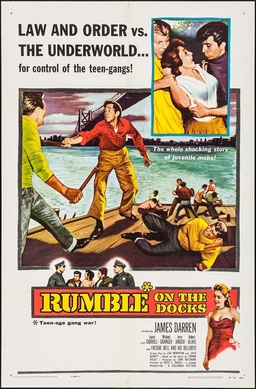
Rumble on the Docks is a 1956 American crime film noir directed by Fred F. Sears and starring James Darren, Laurie Carroll, Michael Granger and Robert Blake. The film was based on the novel of the same title by Frank Paley. It was produced by Sam Katzman for release by Columbia Pictures.
Frank Eugene Taylor was an American book publisher and movie producer. During his four-decade career in publishing he worked with authors including Vladimir Nabokov, Eldridge Cleaver, and George Orwell. His work as a producer in Hollywood includes the 1961 film The Misfits. Taylor's papers are held at the Lilly Library, Indiana University, Bloomington, Indiana, and include correspondence with Charlie Chaplin, James Agee, Ralph Ellison, and Christopher Isherwood.

Victoria Endicott Lincoln Lowe, who wrote under the name Victoria Lincoln, was an American novelist, biographer, and true crime writer. Her best known novel, February Hill (1934), was adapted for stage and screen. She won the Edgar Award for best fact crime book for her A Private Disgrace: Lizzie Borden by Daylight.
References
- 1 2 "Harvey Breit Correspondence". Northwest University. Retrieved May 2, 2013.
- ↑ "Alice S. Morris, 90, An Editor and Writer". The New York Times . September 30, 1993. p. B11.
- 1 2 3 "Harvey Breit, 58, writer, is dead; Poet, Playwright and Editor at Times Book Review". The New York Times. April 10, 1968.
- ↑ "People, May 14, 1951". Time . May 14, 1951. Archived from the original on June 30, 2013. Retrieved May 2, 2013.
- ↑ Breit, Harvey (May 25, 1952). "Talk with Mr. Chambers". The New York Times. Retrieved May 2, 2013.
- ↑ "People, Feb. 7, 1955". Time. February 7, 1955. Archived from the original on December 15, 2008. Retrieved May 2, 2013.
- ↑ "Books: The Legend of Dylan Thomas". Time. May 30, 1955. Archived from the original on June 30, 2013. Retrieved May 2, 2013.
- ↑ "Harvey Breit". Contemporary Authors Online. Gale. 2002.
- ↑ "Selected Letters". Library of Congress. Retrieved May 2, 2013.
- ↑ Gelb, Arthur (November 25, 1957). "Schulberg Novel Ready for Stage; 'The Disenchanted,' Starring Jason Robards Jr., Due in '58--Casting Notes". The New York Times.
- ↑ "The Theater: New Plays in Manhattan, Dec. 15, 1958". Time. December 15, 1958. Archived from the original on February 9, 2006. Retrieved October 20, 2009.
- ↑ Barnes, Clive (March 7, 1968). "Theater: Reluctant Guru; Mohyeddin Excels in 'The Guide' at Hudson". The New York Times. Retrieved August 31, 2009.
- ↑ "Television: Mar. 22, 1968". Time. March 22, 1968. Archived from the original on June 30, 2013. Retrieved May 2, 2013.
- ↑ "Mrs. Campbell Rewed; Former Patricia Rinehart Is Married to Harvey Breit". The New York Times. May 28, 1955. p. 9. Retrieved October 20, 2009.
- ↑ "Books: One Man's Volcano". Time. December 31, 1965. Archived from the original on June 30, 2013. Retrieved May 2, 2013.